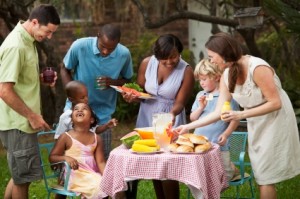We've
got relationships on the brain this month. Having a friendly relationship with your neighbors can be a crucial survival tool. Ideally every individual and family is prepared, but it’s almost impossible to gather all the information, knowledge, skills, and equipment you’ll need for every possible scenario. This is where building a neighborhood group or a network of prepared people can help.
Once you’ve got your basic short-term survival kit and food storage taken care of, take a look at other prepared families and see how you might help each other. The idea is to Replace like-minded, trustworthy individuals who have differing skills, and are willing to work together in a crisis.

To make sure your support network is in place before disaster hits, follow these baby steps.
Baby Step 1: Make a list of your skills and resources.
Think of services you can provide and what equipment you have.
Baby Step 2: Make a list of skills and resources you need.
Some of the most valuable resources are people with skills and equipment that are common, yet specialized. Here are some commonly needed skills:
- Paramedic, nurse, other medical workers
- Construction workers (with access to a backhoe, jackhammer, or crane)
- Electricians, plumbers, carpenters, or masons
- Mechanics, drivers, or people with a HAZMAT license
Baby Step 3: Meet your neighbors.
Borrow a cup of sugar. Yeah, it’s an excuse… but if you need a reason, this one is as good as any. To thank them, make a batch of something sweet and when you take it over, chat for a bit.
If you’re not the outgoing, introduce-yourself-in-person type, no problem!
Diane Schmidt at About.com has a great idea.
“I once wrote a note and attached it to a jar of homemade jam and left it on a neighbor's porch. I introduced our family, said where we lived, and that we were around if they needed anything. It was simple and brief and in return, we found some really great friends.”

Baby Step 4: Get to know your neighbors better.
Invite your neighbors over for a backyard hot dog roast, a mid-winter wassail party, or multi-family game night. The event doesn't have to be elaborate. In fact, you’ll enjoy it more if it’s casual, low-key, and fun.
- Play games based on specific skills: knot tying, communication, problem solving, first aid, etc.
- Play a get-to-know-you game: Write questions on cards and use them as prompts.
Given a specific situation (stranded in your car, lost in the woods, etc.) what would you do?
Have you ever survived a natural disaster?
If your neighbors don’t respond enthusiastically, don’t get discouraged. There are plenty of people in town who are interested in prepping. They may lay low, but you’ll Replace them.
Baby Step 5: Reach out to people in your area via our Forum.
Our forum is a virtual network across the U.S. Contributors actively discuss topics and answer each other’s questions. You’ll Replace that there is a wide range of participants, from beginners to seasoned preppers. Click here to visit the Emergency Essentials Forum.
You may also consider posting a note on the message board at a local outdoor supplier, hunting and sporting goods store, or on the American Prepper Network.
Always use caution when communicating via the internet. Don’t post any personal information like your home address or phone number. If you are going to meet someone you’ve been introduced to online, meet in a public place, tell someone you trust where you’re going, who you’re meeting, and when you plan to return.
Build up a network before a disaster hits your neighborhood!



2 comments
johnny
This blog is great. I realy like it!
beprepared
Johnny, thanks for reading and giving us feedback!